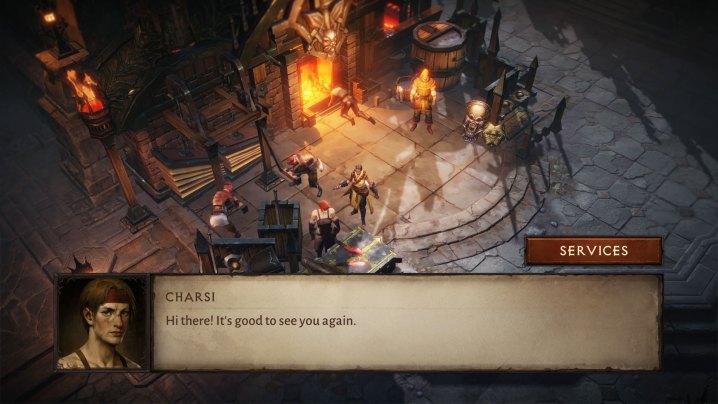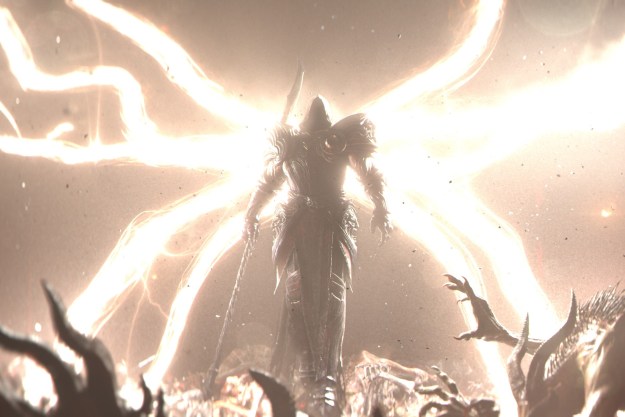On an ill-fated evening in November 2018, Blizzard decided that a gathering of hardcore gamers was the best place to unveil a new mobile-only game in a franchise that was begging for a proper numbered sequel. Conditioned over the years to believe that its adoring fans would lap up anything with its brand IP attached, Blizzard endured a vocal backlash that tore deep into its cushy reputation.
Diablo Immortal was revealed to a sea of boos: The audience Blizzard had fostered over the decades felt betrayed by the notion that the slow-turning cogs of an Activision merger were finally transforming a company that cared about its community into one that simply cared for its bottom line.
The event spawned the now infamous “Don’t you guys have phones?” meme that will, for generations to come, remind us of the moment Blizzard’s player-friendly mask cracked to reveal gaming’s great villain. It was like the moment we watched Ralph Wiggum’s heart break in that classic Valentine’s Day episode of The Simpsons.
The mistake Blizzard made with Diablo Immortal wasn’t its creation, though, but simply where the company chose to announce it. We’ve had a few years to calm down, and with the game’s release on the horizon, it’s time to admit that Blizzard’s most controversial title could very well be its biggest business venture yet.

The mobile market
In the West, mobile games continue to be seen as the enemy by some: Casual titles with lackluster visuals, gameplay-limiting timers, and copious reasons to nickel-and-dime players for the privilege of continued play. The conniving monetization practices are seen as a scourge slowly leaking into full-priced titles, threatening to turn classic franchises into money-grabbing, soulless shells of their former selves that commercialize a key aspect of gameplay.
For the rest of the world, though, free-to-play games are more universally accepted by gamers. Endless runners and Match 3 puzzle games top the charts in the West, but in China, India, and even Japan, it’s hypercompetitive games like Arena of Valor, PUBG Mobile, and puzzle/RPG hybrid Puzzle & Dragons that attract spending in excess of hundreds of millions of dollars a month.
According to Sensor Tower, recent worldwide hit Genshin Impact collects 74.2% of its global revenue from Asia. That’s huge. While Western parents wistfully spam social media walls to get another attempt at Stage 145 of Zynga’s latest rehashed puzzle game, mobile players on the other side of the world are taking part in gaming’s biggest tournaments virtually every other weekend. They’re big business in Asian territories, making it maddening why Blizzard chose the Western-focused Blizzcon as the place to announce Diablo Immortal, especially after announcing Starcraft Remastered at an event in South Korea just a year prior.
Deal with the devil
So why is the Diablo franchise preparing to make the jump to mobile? It isn’t hard to find those still toiling away at the now 20-year-old Diablo II. Like an MMO, deep character growth and the endless grind for bigger and better loot drives engagement. With similar time sinks long being staples of Korean internet cafes, it’s hard to deny that a Blizzard-approved title you can play on the go will be anything less than a major hit in territories that have a track record of spending copious amounts of time and money on any title that permits it.

Going off early impressions, the West’s cold heart has begun to thaw, warming up to its potential as well. Despite all the initial hate, alpha previews of Diablo Immortal have been strong. IGN, Game Informer, and even The Verge all praised the title that, just a few years ago, sounded like a worst-case scenario for the future of the franchise — though the announcement of a proper numbered sequel at the following year’s Blizzcon might have played a part in the softening the idea of a mobile installment. Set between the events of Diablo II and Diablo III, it’s time to view the handheld version as a noninvasive spinoff. If it helps, consider it a companion app for those looking to keep the loot grind going when they’re away from the main game.
With free-to-play titles, monetization is always what makes or breaks the experience. They’re designed to go on for as long as they can make a profit: Charge for the wrong experience, and you can bet the game will be scrubbed from existence before long, leaving a sour taste in the mouths of those who did open up their wallets. Thankfully, Diablo Immortal doesn’t seem to be making you pay to play for extended periods of time. You can choose to play completely free, or buy into a periodic Battle Pass–an element virtually every successful F2P game in recent years has adopted in some way already.
The fear of monetizing the addictive bread-and-butter loot grind that popularized the franchise appears safe. Plus, the recent console versions of Diablo III proved the experience isn’t locked behind the feel of a mouse and keyboard, so on-screen controls shouldn’t put any real damper on the experience, either. Player-versus-player combat makes its return after being absent from the last main release, too, ensuring there’s a case for the hypercompetitive types to grind hard to keep their edge.

Whether players personally decide to give it their time or not, it would be naïve to think Diablo Immortal won’t go on to be potentially the best-performing title in the entire series. It’s tough to reasonably predict how microtransactions will stack up against tens of millions of unit sales in the long term, but history has made a case for the continued success of the mobile market. There’s a reason you can already find plenty of other big-brand IPs on phones these days.
Traditional boxed games tend to make their biggest sales in the first month of release and trickle on until a sequel shows up. Mobile games, on the other hand, can easily maintain, or even far exceed, that momentum for months, if not years, after release. The past has proven the sharpness of Diablo’s gameplay hook time and time again, and by eyeballing the billions of smart devices out there, it could dig far deeper yet.
Editors' Recommendations
- Xbox Game Pass gets its first Activision Blizzard game very soon
- The video game industry has laid off thousands this year. Here’s what that means for you
- 2023 set an incredibly high bar for video game sequels
- Everything announced at BlizzCon 2023: Diablo 4 DLC, Cataclysm Classic, and more
- Microsoft has acquired Activision Blizzard: What does that mean for you?




